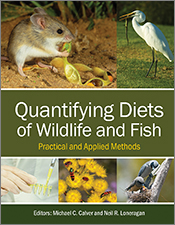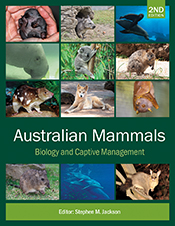Quantifying Diets of Wildlife and Fish
Practical and Applied Methods
Edited by: Michael C. Calver, Neil R. LoneraganExplores methods for studying wildlife diets, and how they can be applied across different groups.
Quantifying Diets of Wildlife and Fish presents different techniques available to study animal diets. Ecologists determine animal diets to build natural history knowledge, test hypotheses in ecological theory and make informed management decisions for important ecosystems. Many researchers use techniques traditionally applied to the animals they study, rather than techniques with the greatest potential for the aims of each project. In an effort to encourage researchers to consider new approaches, this book focuses on the techniques, rather than on particular groups of organisms or specific environments. + Full description
With contributions from leading ecologists, chapters explore experimental design, observational techniques (including new technologies), stomach contents and faecal analysis, eDNA, tracers and stable isotopes. They also cover the latest multivariate methods of analyses suitable for describing animal diets and feeding relationships, as well as testing hypotheses relevant to ecological theory, environmental management and biological conservation. The expert knowledge provided will encourage readers to look beyond the boundaries of their specialties, assist in testing important hypotheses and provide insights into management problems. The examples in this book cover a range of vertebrates and invertebrates, as well as different environments, to open these methods up for novice ecologists and stimulate lateral thinking in more experienced researchers.
- Short descriptionNews
Sales in Australia and New Zealand only. Elsewhere, this title is available through CABI (external link).
Reviews
"A tasty delight, this new book released through CSIRO Publishing […] details the different techniques available to study wildlife diets and how they can be applied across different groups."
Dr Phil Tucak, Wildlife Health Australia, 18 April 2024
Details
Paperback | May 2024 | $140.00ISBN: 9781486315000 | 200 pages | 270 x 210 mm
Publisher: CSIRO Publishing
B&W photographs, Illustrations
ePDF | May 2024
ISBN: 9781486315017
Publisher: CSIRO Publishing
Available from eRetailers
ePUB | May 2024
ISBN: 9781486315024
Publisher: CSIRO Publishing
Available from eRetailers
Features
- Explores traditional approaches to studying animal diets as well as newer methods such as chemical tracers and eDNA techniques.
- Brings together knowledge from terrestrial and aquatic systems (spanning freshwater to marine environments).
- Includes a broad range of taxonomic groups from invertebrates to lions and sharks.
- Outlines essential techniques for data collection that underpin the development of ecosystem models to assess system dynamics.
- Discusses testing hypotheses relevant to ecological theory, environmental management and biological conservation.
Contents
PrefaceAbout the editors
List of contributors
1: Why and how should we study animal diets?
2: Applying natural history field observations to describing animal foraging behaviour
3: Stomach content analysis
4: Faecal analysis
5: Metabarcoding to assess animal diets
6: Diet tracers in food webs: fatty acids and their carbon and hydrogen stable isotopes
7: Stable isotope analysis
8: Field experiments on foragers, food and their interactions
9: Demystifying multivariate approaches for analysing dietary data
10: Where to from here in the study of animal diets?
Index of common names
Index of scientific names
Index of topics
View the full table of contents (PDF, 34KB).
Authors
Emeritus Professor Michael C. Calver is based in the School of Environmental and Conservation Sciences, as well as the Centre for Terrestrial Ecosystem Science and Sustainability in the Harry Butler Institute at Murdoch University. Michael describes himself as a frustrated entomologist who, despite earning his PhD in entomology, soon discovered that prospective research students were more interested in the kind of animals that view insects as food. Thus, he converted to a wildlife biologist.
Emeritus Professor Neil R. Loneragan is based in the School of Environmental and Conservation Sciences and the Harry Butler Institute at Murdoch University and is an Adjunct Professor at IPB University in Indonesia. His interests lie in understanding marine and estuarine food webs, fisheries dynamics and the application of ecological principles to evaluating fish stock enhancement and marine ranching.








